






Andy Pierucci
Spencer Haymond
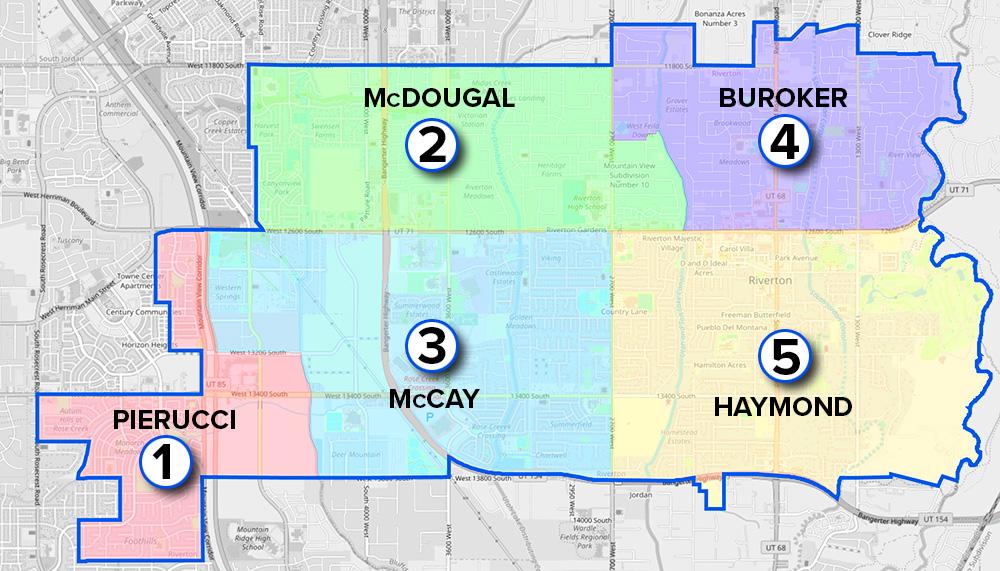

FY 2025-2026
Budget Special Recognition
Administration / Department Heads
Kevin Hicks - City Manager
Ryan Carter – City Attorney
Cary Necaise – Public Works Director
Jason Lethbridge – Development Services Director
Sheril Garn – Events & Operations Director
Josh Lee - Communications Director
Shane Taylor – Chief of Police
Nick Geer – Administrative Services Director
Division Managers and Contributors
Mark Smith – Chief Building Official
Christopher G. Bown – Justice Court Judge
Jiny Proctor – City Treasurer
Stacie Olson – Assistant Public Works Director
Craig Calvert - Purchasing Manager / Contract Administrator
Brook Bowen - Graphic Design & Marketing Specialist
Meghin Sullivan – Assistant Administrative Services Director
Contact Information
Riverton City Administrative Services Department
12830 S Redwood Rd
Riverton, UT 84065
Phone: 801‐208‐3122
finance@rivertonutah.gov
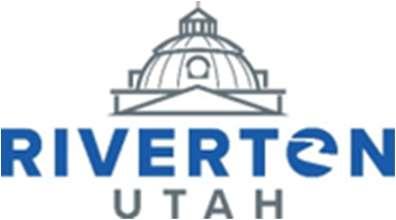
Honorable members of the City Council and residents,
It is after careful coordination with city sta , a thorough review of strategic objectives, and a commitment to responsible stewardship of public funds that I am pleased to present to you the Mayor’s Budget for fiscal year 2026. This proposed budget reflects both our long-term vision for Riverton and the immediate needs expressed by our residents, ensuring continued progress and sustainability in the year ahead.
Detailed information on the City's financial position can be found in the enclosed budget proposal. Below are key features I would like to highlight:
There are no proposed fees or tax increases.
Riverton City maintains an AAA bond rating, with a debt per capita reaching an historic low at $675.
Total expenditures across all funds are projected at $70.6 million for FY 2026, a decrease from $76.1 million in FY 2025. This reduction is primarily attributed to the completion of large construction projects, including the Green Well.
The general fund, often seen as the clearest reflection of responsible budgeting, remains steady and reliable. For Fiscal Year 2026, we are increasing the general fund by only 4% compared to last year. General fund increases over the last decade have largely followed inflation and population growth numbers. This careful growth reflects our commitment to maintaining essential services while managing taxpayer dollars with prudence.
Over the past decade, Riverton City has experienced an impressive increase in sales tax revenue of over 200%. While the rapid growth of previous years is beginning to plateau, the city still projects $13.25 million in sales tax revenue for FY 2026—a slight but steady increase from the prior year.
It is essential for the City to support our police department and ensure they have the resources needed. I am proposing the addition of two new police o icers, reinforcing our commitment to public safety and the well-being of our community.
This encouraging fiduciary capacity opens the door to innovation and cost savings for our residents.
As part of the proposed operational changes to the city, this budget includes a plan to phase out curbside recycling and transition to strategically located drop-o recycling sites throughout the city. Recycling can be an e ective sustainability tool when properly executed. However, concerns persist that a significant portion of materials collected using the curbside method ultimately end up in landfills, while regional recycling strategies indicate a much more successful recycling rate. It is essential that Riverton’s recycling e orts are both meaningful and impactful—not merely symbolic.
I would also like to highlight several major projects included in this budget proposal. I believe these initiatives are closely aligned with the city’s strategic priorities and operational goals:

The next phases of the Welby Canal Trail and Pedestrian Bridge project will focus on extending the trail system to connect with existing sidewalks, parks, and trail networks. Planned improvements include lighting, landscaping, and wayfinding signage to enhance safety and usability. These enhancements will further advance the community’s vision for a more connected and pedestrian-friendly Riverton.
The city was awarded a $710,000 county grant to renovate the park behind City Hall into an all-abilities park, enhancing accessibility and inclusivity for residents of all ages and abilities. In addition, the Mayor’s budget allocates $4,500,000 in impact fees to support the development of a new 10-acre park on Riverton’s west side. This new park will be created in partnership with Edge Homes, expanding recreational opportunities in a rapidly growing area of the city. Together, these investments reflect a strong commitment to improving community spaces and promoting active lifestyles.
For fiscal year 2026, the state-mandated secondary water meter installation project is expected to be completed. Nearly all residential properties within city boundaries will be equipped with meters. No additional rate charges to residents have been instituted. This final phase was funded through State resources and the American Rescue Plan Act, concluding the multi-year, state-mandated initiative.
This proposed budget reflects our collective responsibility to serve the people of Riverton with integrity, transparency, and accountability. As stewards of public trust, we must continue to act with care and purpose in shaping the future of our city. I value your perspective and invite your input as we refine this proposal together.
I look forward to our continued collaboration and encourage you to contact me with any thoughts or questions you may have.
Best regards,

Mayor Trent Staggs

• Maintain a strong sense of community.
• Maintain a visible public safety presence and increase citizen engagement.
• Actively engage and inform residents.

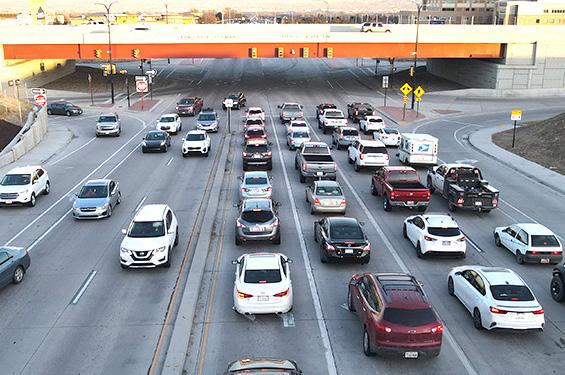
• Expand, improve, and maintain an active transportation system.
• Properly develop city infrastructure and facilities.
• Enhance the digital infrastructure of the city.
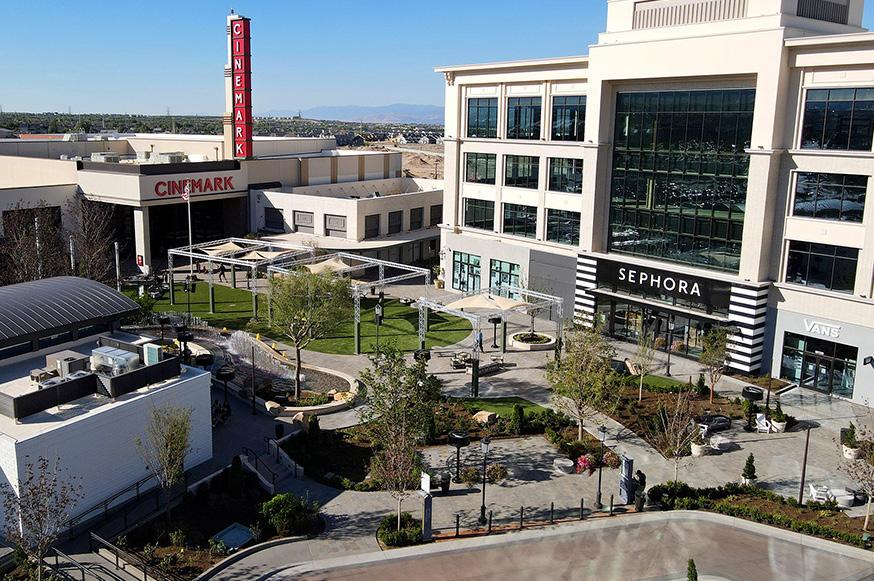
• Develop a proactive economic development strategy.
• Attract and recruit businesses to the community and retain existing businesses.
• Enhance the Riverton Town Center area.
Riverton City’s strategic priorities guide the efforts of elected officials and staff and help align city resources with need. In January of each year, the Mayor and City Council meet to discuss progress on priorities and determine modifications to the strategic plan to keep the city moving forward. The complete Strateigic Priorities can be found online at rivertonutah.gov/government/strategic-plan.php

• Improve and expand the city’s water resources and systems.
• Remain fiscally responsible and ensure that services are sustainable into the future.
• Properly plan for the future to ensure the long-term stewardship of city property and facilities.
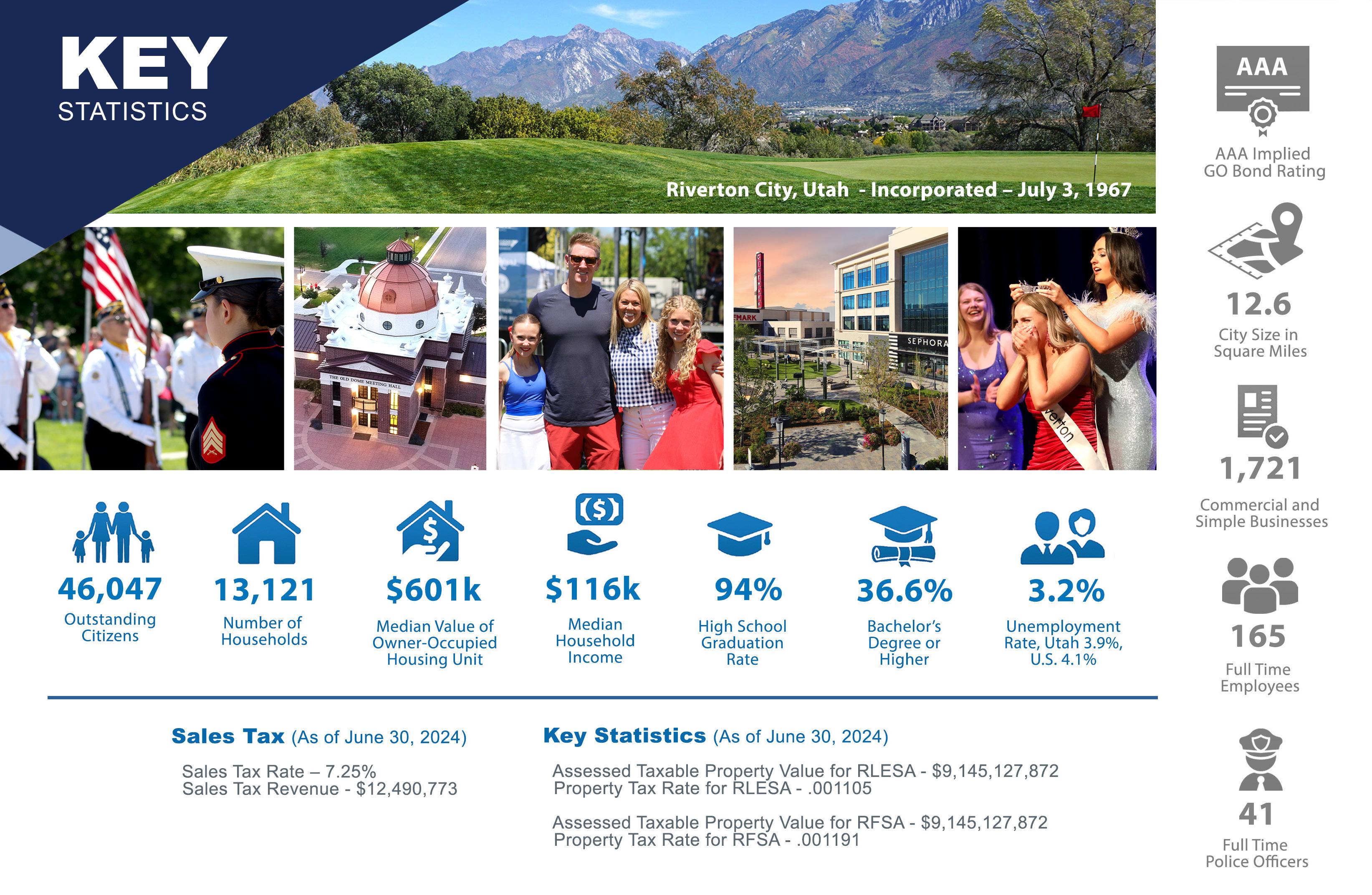
FISCAL
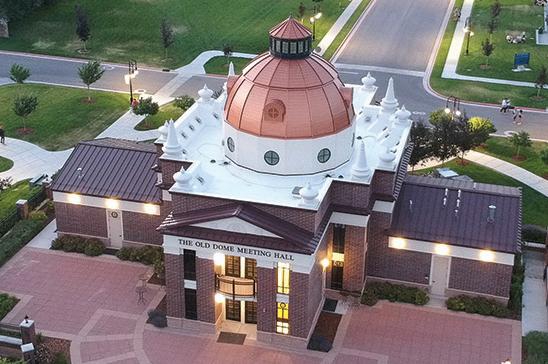
Supplies the resources needed to support the daily operations of a government entity. This fund captures all assets and liabilities not allocated to other funds. The general fund is reported separately for budget purposes. C Roads and Police are combined into the general fund for financial reporting purposes.


Funds restricted or committed to a specific purpose other than debt service or capital projects.
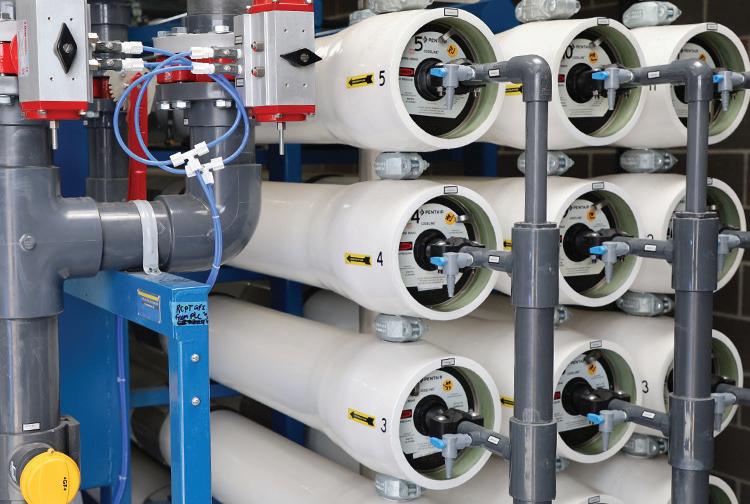
Funds reserved for long-term capital investment projects. This reserve fund ensures that the entity has adequate funding to finance the project.
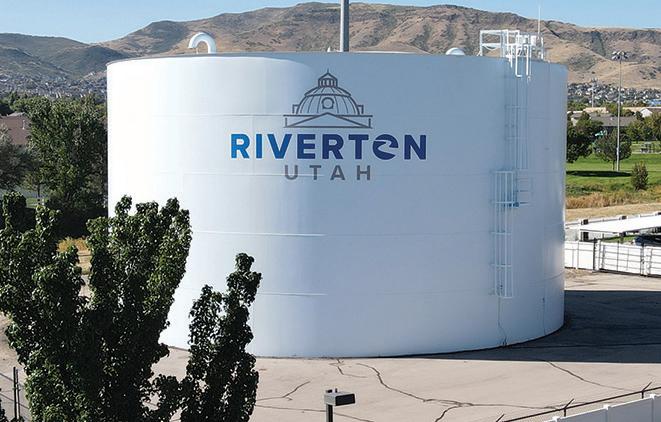
Account for goods or services provided to the public on a user-charge basis, similar to the operations of a business (e.g. providing water, secondary water, or sanitation services).

The City reports the following as special revenue funds: The Riverton Development Agency (RDA), Riverton Law Enforcement Service Area (RLESA), and the Riverton Fire Service Agency (RFSA).
The City reports the following as capital project funds: Capital Improvements Fund (CIP), CIP-Stormwater, CIP-First Class Roads, Grants Fund, and the Parks, Fire, Stormwater, and Roads Impact Fee Funds.
The City reports the following as enterprise funds: Culinary Water, Culinary Impact, Secondary Water, Secondary Impact, and Sanitation.
The Mayor serves as the Executive leader in Riverton City. The Mayor is the chair of the council, only voting in special circumstances. The Mayor is also the budget officer and presents the Mayor’s budget for consideration each year.
The Mayor’s Office is funded through the general administrative split: General Fund (70%), Culinary Water Fund (15%), and Secondary Water Fund (15%).


The Riverton City Council is the legislative branch of city government, consisting of five elected members from distinct districts throughout the City. The council duties include adopting ordinances, passing resolutions, establishing City policy, establishing strategic priorities, regulating zoning, establishing city fees, creating long-range plans, setting regulatory standards for the provision of city services, and adopting the City budget.
The City Council is funded through the general administrative split: General Fund (70%), Culinary Water Fund (15%), and Secondary Water Fund (15%).
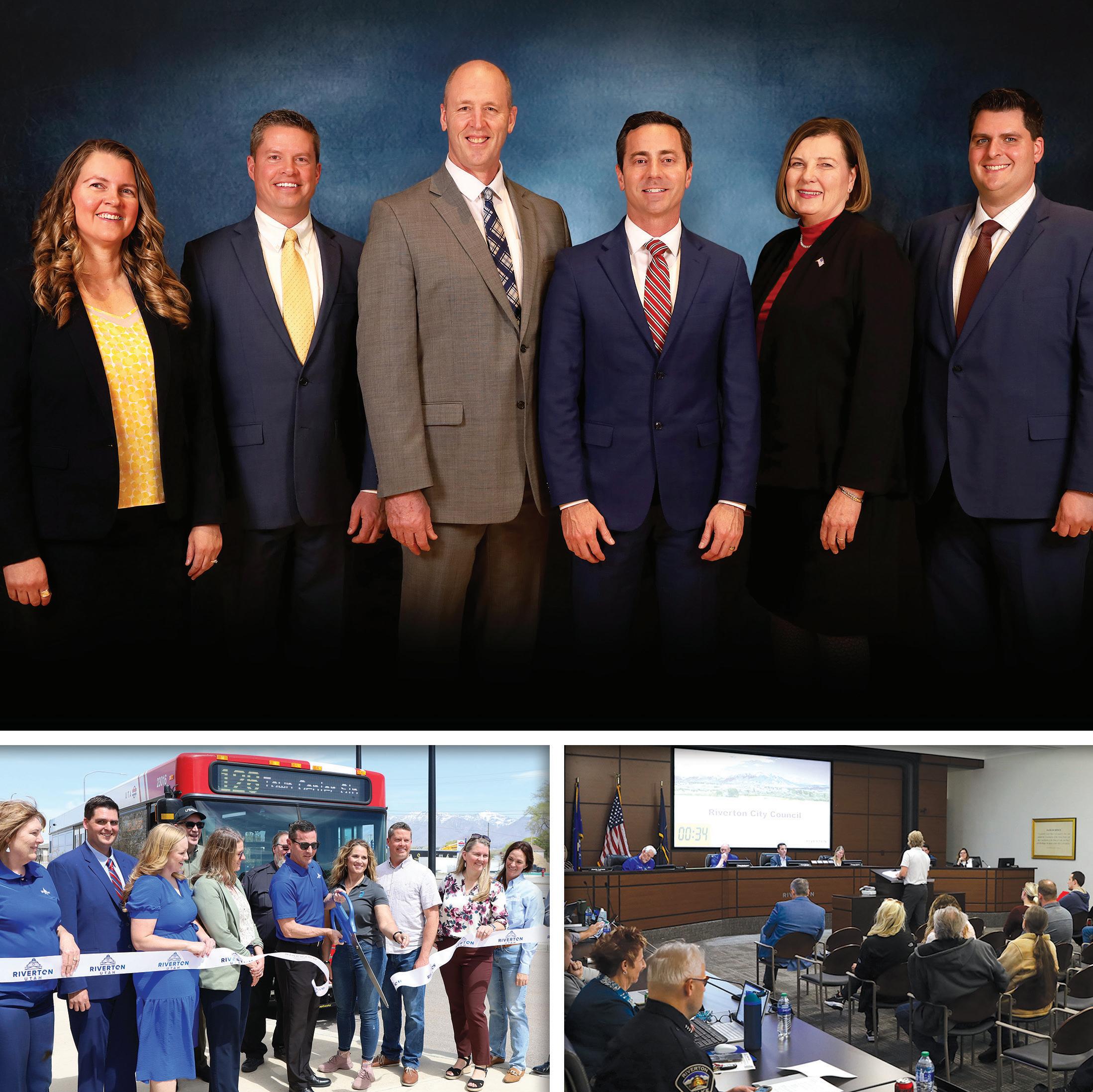

The City Manager oversees the dayto-day operations of the City. The City Manager is appointed and reports directly to the Mayor and City Council. All Department Heads are appointed by the Mayor with advice and consent of the Council and report to the City Manager.
The City Manager’s Office is funded through the general administrative split: General Fund (70%), Culinary Water Fund (15%), and Secondary Water Fund (15%).
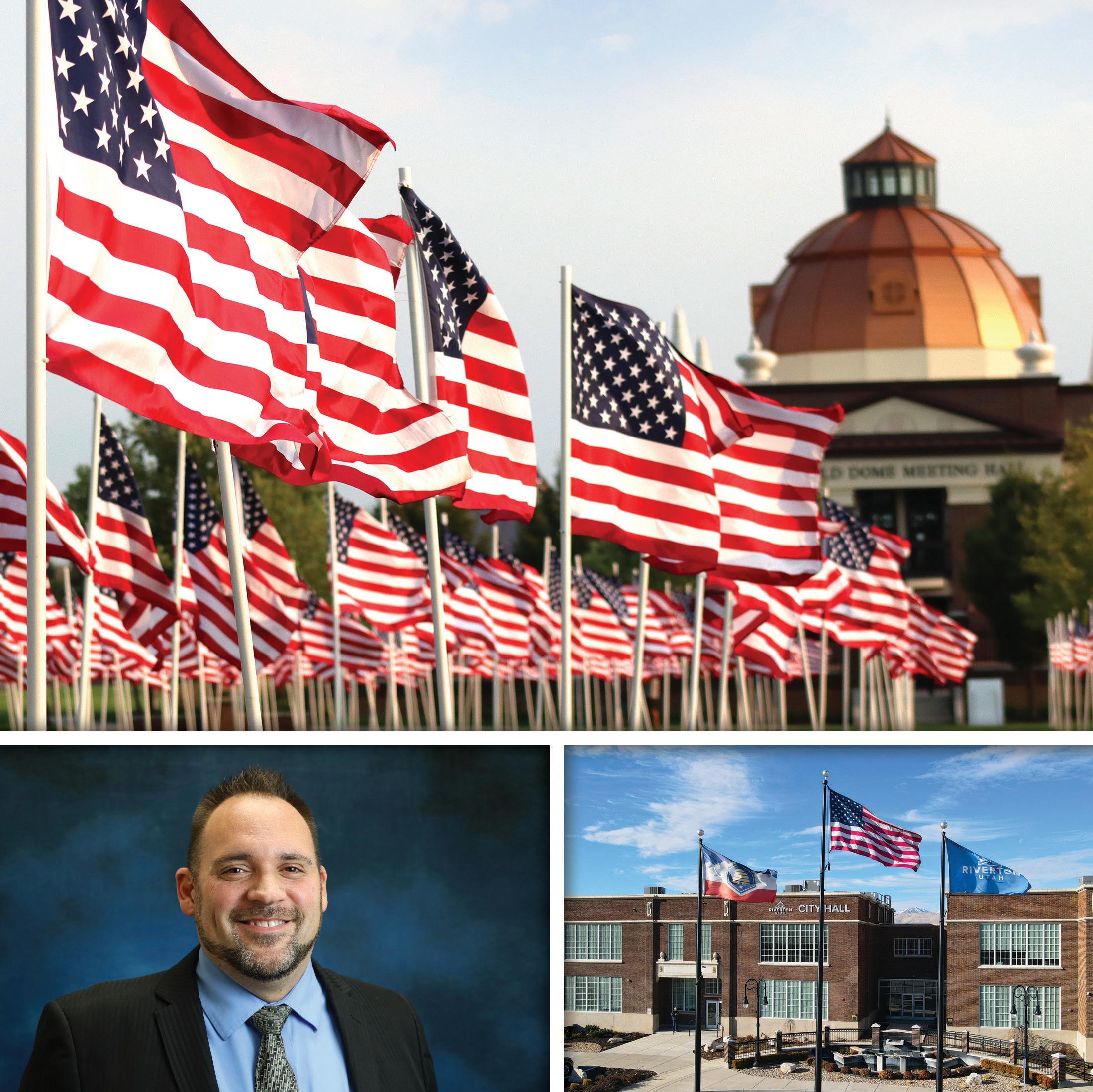

The City Attorney’s Office provides legal services to all departments in the City. The Attorney’s Office includes the City Recorder and Risk Management. Risk Management has its’ own budgetary department, which includes insurance premiums, claims, and the safety incentive program.
The City Attorney’s Office is funded through the general administrative split: General Fund (70%), Culinary Water Fund (15%), and Secondary Water Fund (15%).
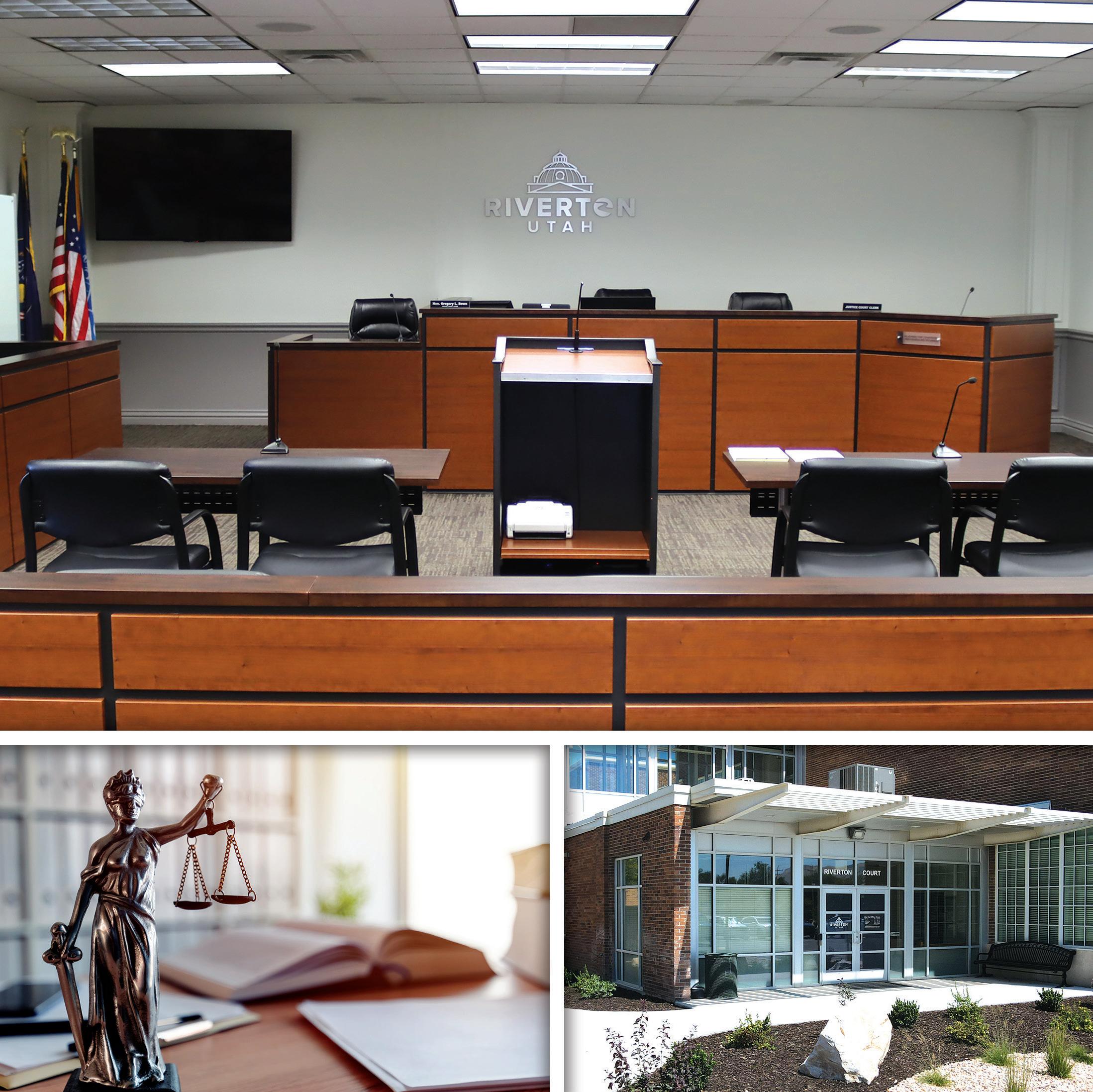

The Communications Department services residents and employees by offering a social media presence, providing public education, and assisting with external communication requests. The business licensing function also is also included in the Communications Department.
Communications is funded through the general administrative split: General Fund (70%), Culinary Water Fund (15%), and Secondary Water Fund (15%).


FISCAL YEAR 2025-2026
The Administrative Services Department serves Riverton City employees and residents through the following functions:
• Accounting and Financial Reporting
• Utility Billing
• Human Resources
• Budgeting
• Purchasing
• Information Technology
• Fleet
All of the Administrative Services Department (except utility billing) are funded through the general administrative split: General Fund (70%), Culinary Water Fund (15%), and Secondary Water Fund (15%). Information Technology and Fleet also have small percentage splits into the C-Roads and Police Operations Funds
Utility billing is funded through the General Fund (5%), Culinary Water Fund (35%), Secondary Water (30%), and the Sanitation Fund (30%).
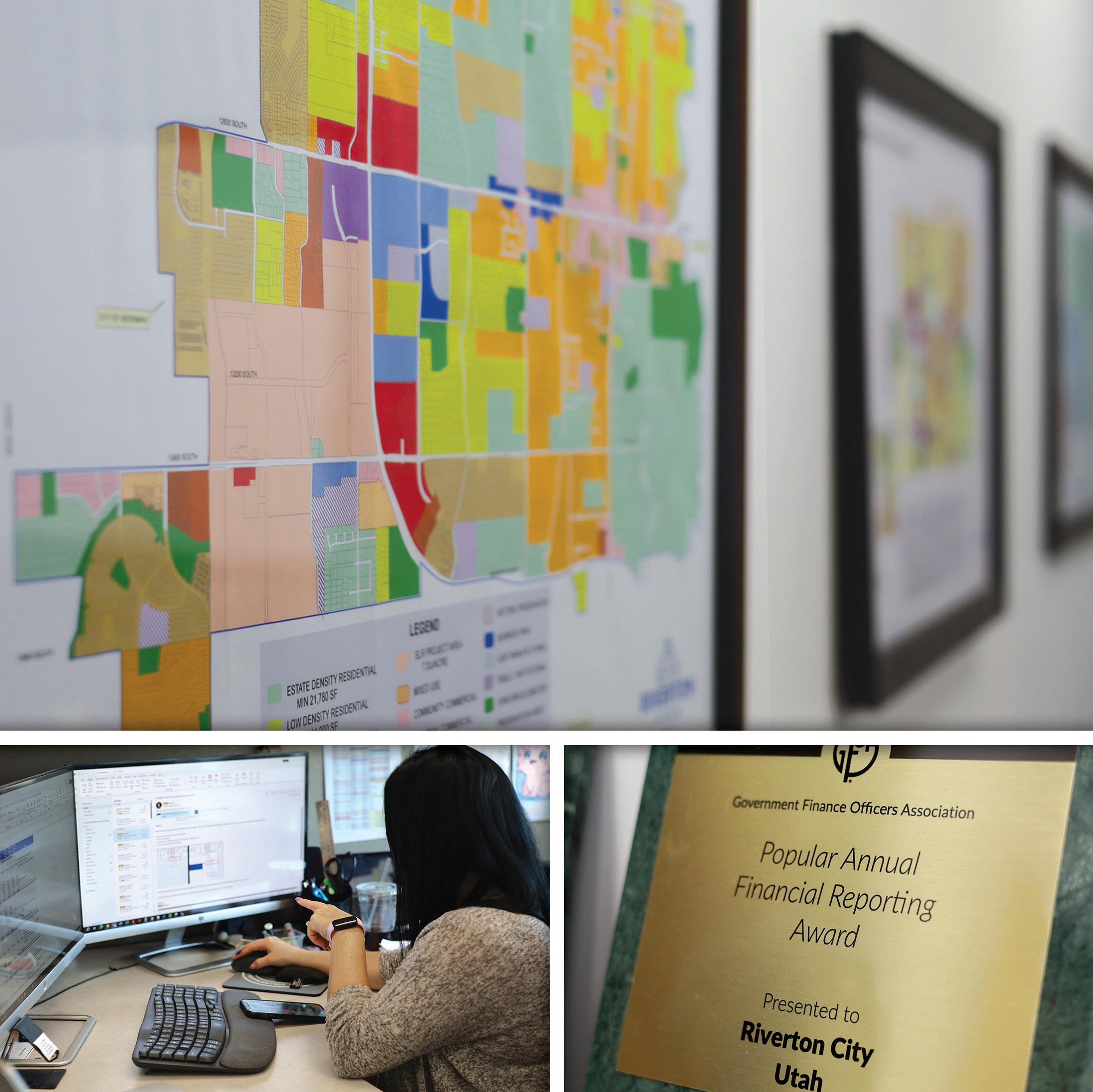

Riverton City Events and Operations departments serve City employees and residents through the following functions:
• Recreation and Community Events
• Facility Management
• The Court
Facility management is funded through the general administrative split: General Fund (70%), Culinary Water Fund (15%), and Secondary Water Fund (15%).
Recreation and community events and the court are fully funded by the General Fund.


The Development Services Department is combined into one budgetary department, while having several functions that serve the public. These functions include:
• Building Services
• Planning Services
• City Engineers
The building and planning departments are funded fully through the General Fund.
The engineering staff is funded through the general administrative split: General Fund (70%), Culinary Water Fund (15%), and Secondary Water Fund (15%).


FISCAL YEAR 2025-2026
Public Works serves the Riverton City residents by maintaining and overseeing management of key infrastructure throughout the City. These functions each have their own budgetary department. The following functions are provided by the Public Works Department:
• Public Works Administration
• Streets – maintenance and road projects
• Street lighting/Blue Stakes
• Water – Culinary and Secondary (Enterprise Fund)
• Stormwater
• Parks Operations/Maintenance
• Cemetery Operations
Public Works Administration is funded through the general administrative split: General Fund (70%), Culinary Water Fund (15%), and Secondary Water Fund (15%).
The Streets function is fully funded by C Roads funds. Streetlighting/Bluestakes, Stormwater, Parks, and Cemetery Operations are all fully funded by the General Fund.
Culinary and Secondary Water are split between their corresponding Funds, at a 50/50 split.


The Riverton City Police department serves to provide safety and support for the residents of Riverton City through the following functions:
• Patrol Services
• K9
• Investigations
• School Resource Officers
• Ordinance Enforcement
• Animal Control
• Crossing Guards
The Police Department is fully funded by the Riverton Police Operations Fund.
Ordinance Enforcement/Animal Control are fully funded by the General Fund.


Riverton City has several revenue streams that fund the departments previously mentioned. Below is an overview of some of the major revenues Riverton City receives to cover operational costs, and capital projects.
• Sales and Use Tax is the single largest revenue source for the General Fund.
• Property Taxes fund the public safety functions in their own funds:
o Police – operations are provided by Riverton City police department, and funded through the taxing entity RLESA (Riverton Law Enforcement Service Area), along with a transfer from the General Fund.
o Fire – operations are provided by the UFA (United Fire Authority), and funded through the taxing entity RFSA (Riverton Fire Service Area).
• Class C roads and additional local transportation taxes are distributed to municipal entities and are restricted for maintenance of eligible roads. These funds are received into Riverton City’s C Roads Fund.
• Franchise taxes are collected in the REDIIF (Riverton Economic Development Investment and Infrastructure Fund) Fund and cover capital projects in that fund or through transfers to other funds.
The following services are provided by the City and charged to residents based on the approved fee schedule:
• Culinary Water is reported as an Enterprise Fund. Fees collected are used to cover operations and capital projects.
• Secondary Water is reported as an Enterprise Fund. Fees collected are used to cover operations and capital projects.
• A stormwater fee is collected in the General Fund and transferred to cover capital projects, with the remaining covering operations in the General Fund.
• Sanitation (garbage collections) is reported as an Enterprise Fund. Fees collected are used to cover operations and capital projects.




Fiscal Year 2025-2026
The General Fund is Riverton City’s principal operating fund. It accounts for all financial resources not accounted for and reported in another fund.
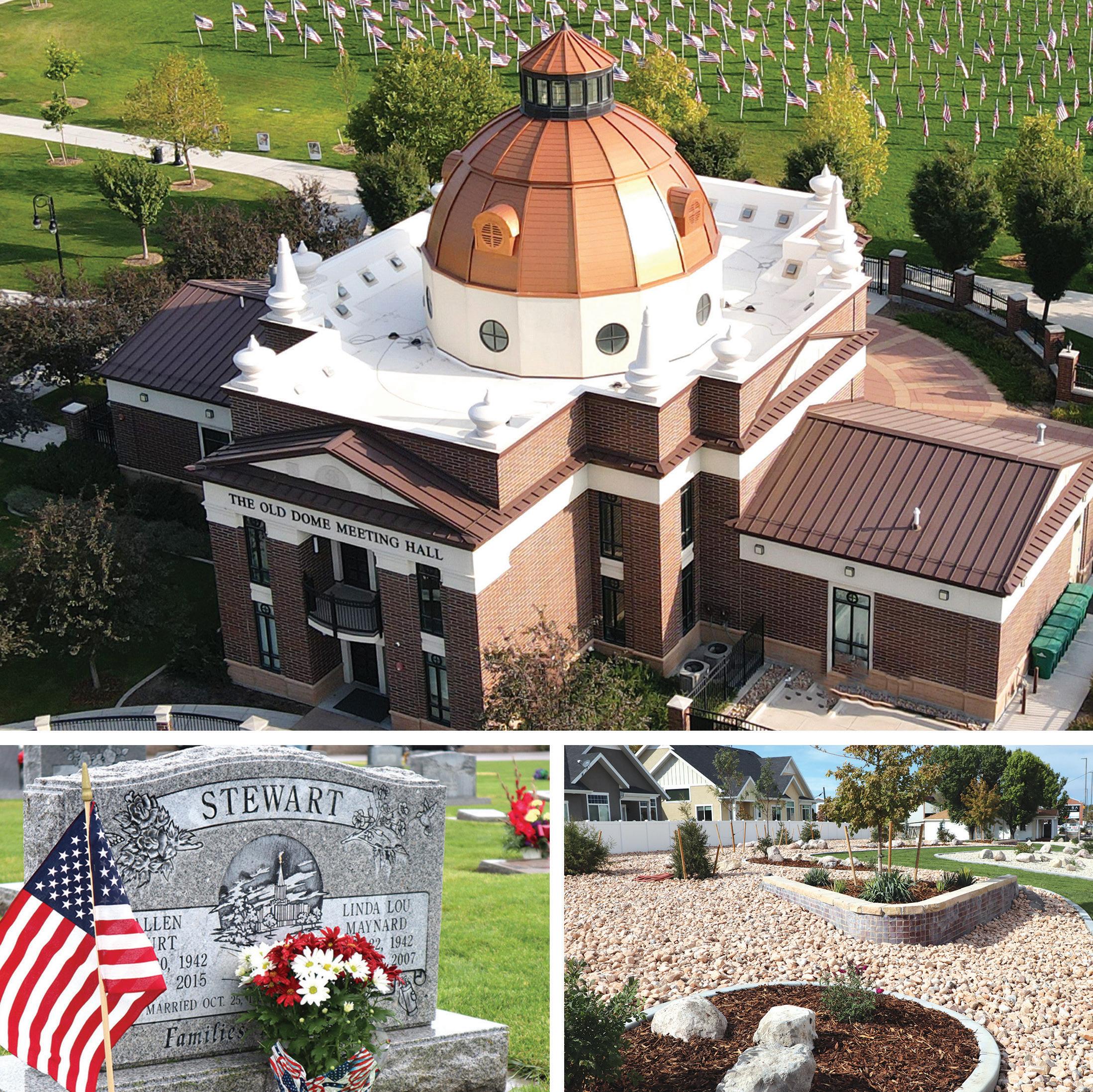

General Fund Expenditures
Various trainings and conferences including but not limited to: ULCT, ICMA, ICSC, Fall elected officials conference, disaster trainings, etc. (split with 510 and 530 funds)
Various trainings and conferences including but not limited to: ULCT, ICMA, ICSC, Fall elected officials conference, disaster trainings, etc. (split with 510 and 530 funds).
Received updated quotes from the Salt Lake County Clerk's office. Anticipated to also have a primary.
(see section 4.6 of the
Personnel Policies and Procedures Manual)
UCMA, ULCT, UGFOA, NLCT, Munis software, and other various local conferences
Council
Additional budget for education and conferences to be allocated to all departments at the discretion of the City Manager
•
• UAPT
• IPMA
• SHRM
• Miscellaneous trainings
Mayor is directing staff to start charging developers a
•
Increase due to GIS being budgeted with IT
budget includes $10,000 (not a full year) savings from broadband change, full annual savings will be larger.
Equipment for servers, cabling, printers
certifications
• Local APA conference
• Building certifications
• Survey • Engineering Certifications
• Engineering inspector training
• Staff licensing
• SLC Recorder data fees
• GOEO database fee
• Miscellaneous expenses
Personal Protective Equipment to meet OSHA regulations (steel toe boots, safety vests, hard hats, gloves, snow cleats, safety glasses)
Increase for inflation, additional barricades, port-a-potties, and a water station
Movies in the park, Halloween, Daddy Daughter, Live in
Fall baseball, flag football, two volleyball tournaments, half marathon, start smart, tennis league, pickleball league
Nutrition, evil scientist, tennis lessons, pickleball league, yoga, all community classes, Live in Real Life Classes
• Includes contracted and in-house maintenance
• Reimbursable portion split out to 10505030-421308
Uniforms for 10 FTE's and summer seasonal employees - budget increased from FY24-25 due to rising costs
Personal Protective Equipment for 10 FTE'ssafety equipment required by OSHA, increased from FY24-25 due to the addition of cemetery communication devices
Certified irrigation technician renewal, ISA membership, UCFC membership, UCPA membership, UNLA membership, Weathertrak subscription renewal
of all city park facilities
New tree planting, tree pruning and maintenance - includes contracted and inhouse services
Repair or replace misc equipment used for
The Class C Roads Fund accounts for repairs and maintenance of Riverton City’s streets, sidewalks, curbs and gutters financed by the City’s share of the gas tax.
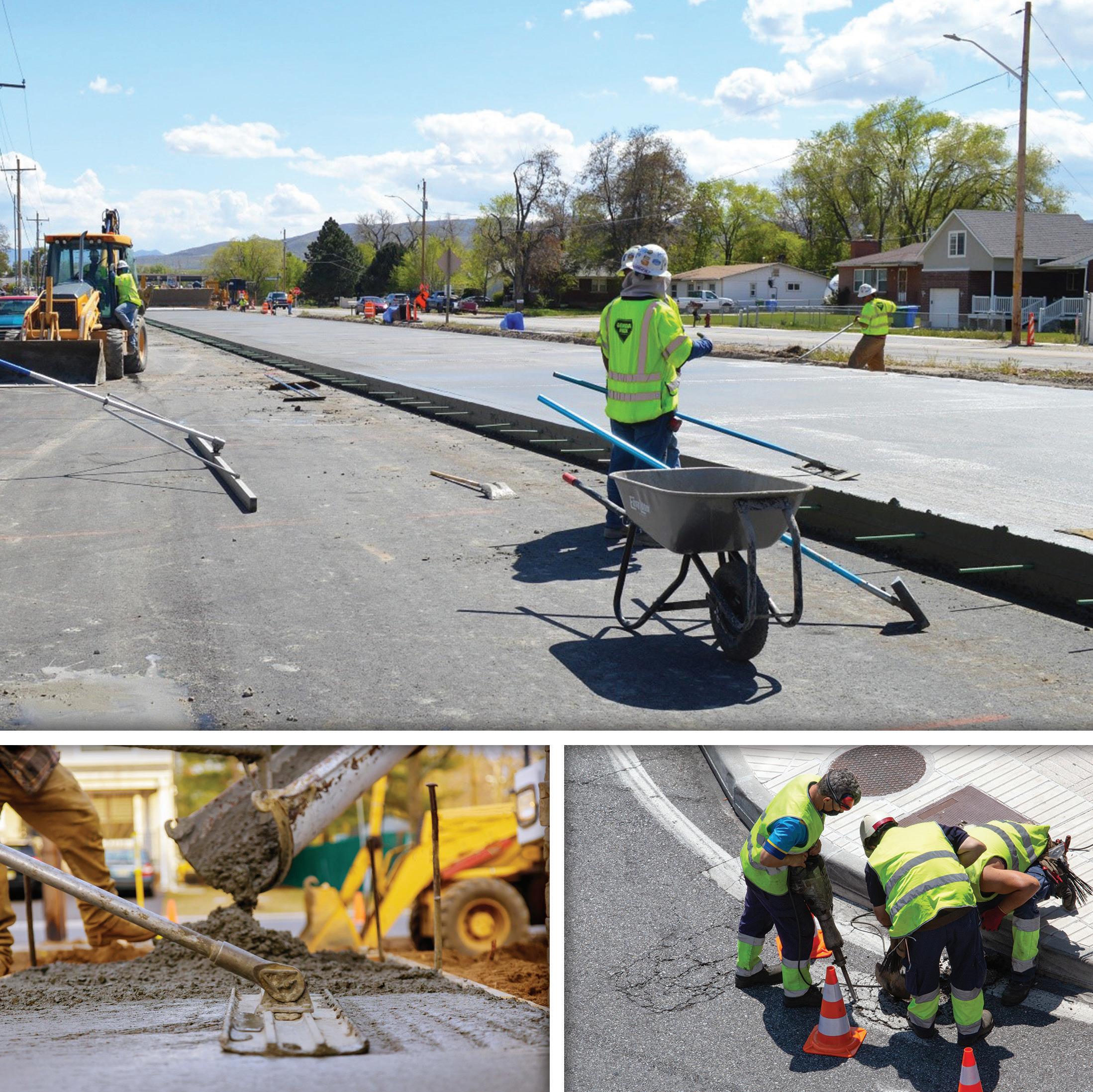

The Riverton Police Department Fund is used to account for law enforcement activities and operations.


The Redevelopment Agency of Riverton City (RDA) Fund is used to account for tax increment generated by designated project areas. It is used to finance infrastructure and other improvements within project areas.


Redevelopment Agency of Riverton City (RDA) Fund Summary
(Riverton Law Enforcement Service Area)
This fund is used to account for property tax and other related revenue of the Riverton Law Enforcement Service Area.


(Riverton Fire Service Area)
This fund is used to account for the property tax and other related revenue of the Riverton Fire Service Area. The service area provides the funding for a fire services contract with the Unified Fire Authority.
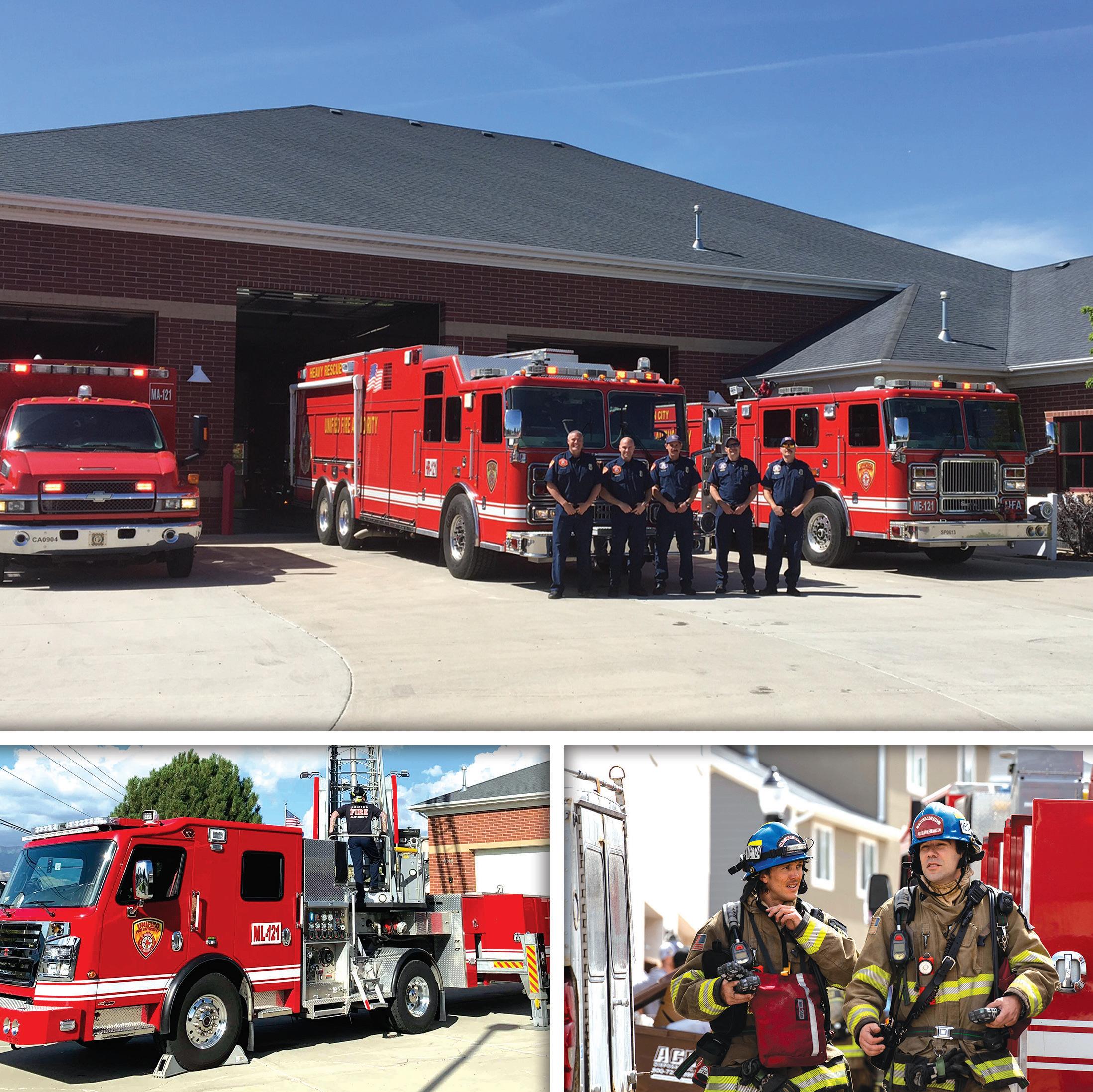

Riverton Fire Serivice Area Revenues
parts, etc.) This budget is used for maintenance items that UFA will pay for but the
The Riverton Economic Development Infrastructure and Investment Fund (REDIIF) is funded by franchise taxes that are budgeted for economic development throughout Riverton. REDIIF is also used to track legislative appropriations and other state and regional grants to be used in roadway projects.
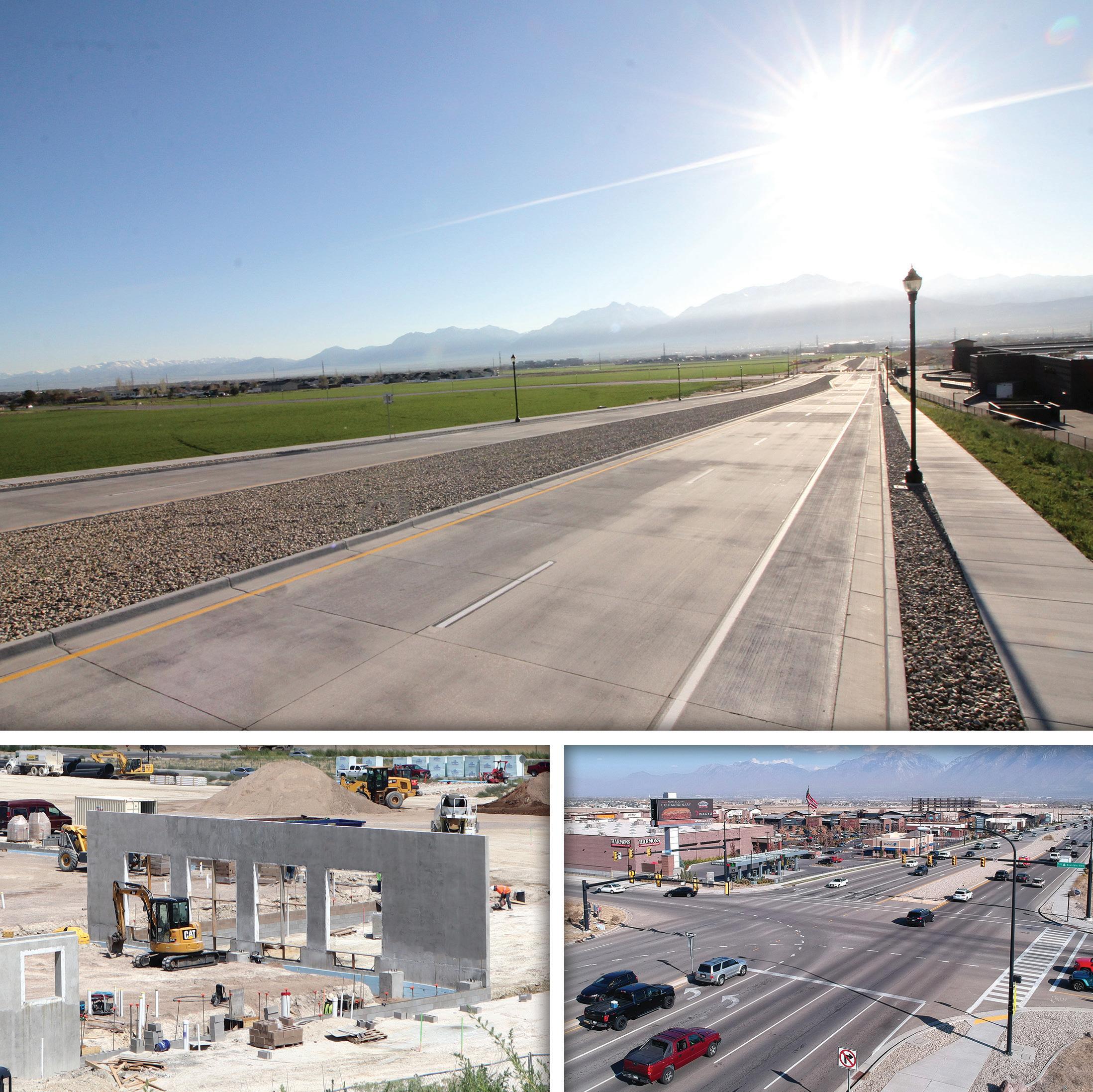

Riverton Economic Development Investment and Infrastructure Fund (REDIIF) Summary
Expenditures
The Park Impact Fee Fund is used to track revenue and expenditures for eligible capital improvements to parks and open space, which are attributable to growth from new development within Riverton.
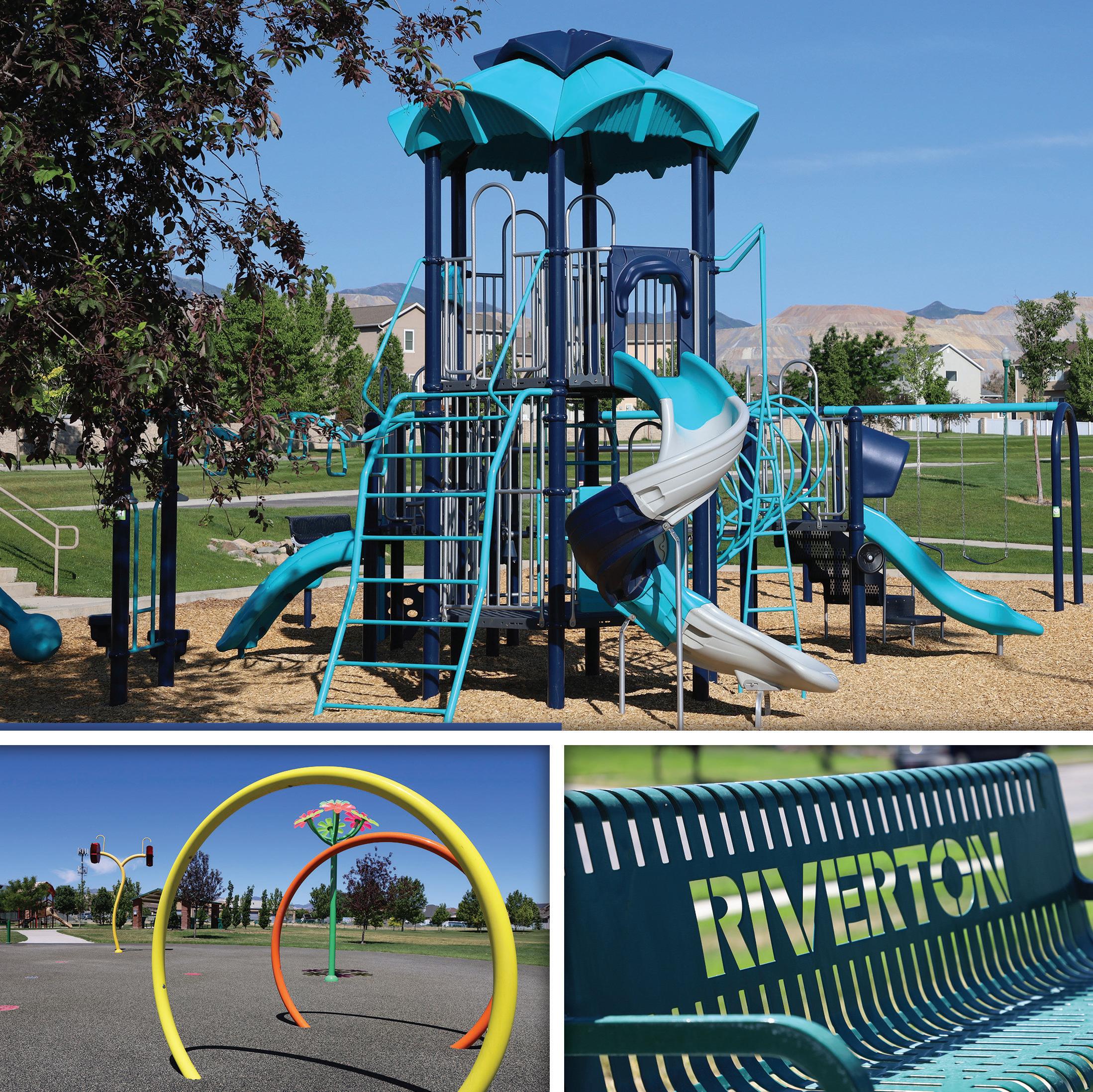

The Fire Impact Fee Fund is used to track revenues and expenditures attributable to growth from new development within Riverton.


The Stormwater Impact Fee Fund is used to track revenue and expenditures for eligible capital improvements to the stormwater system that are attributable to growth from new development within Riverton.
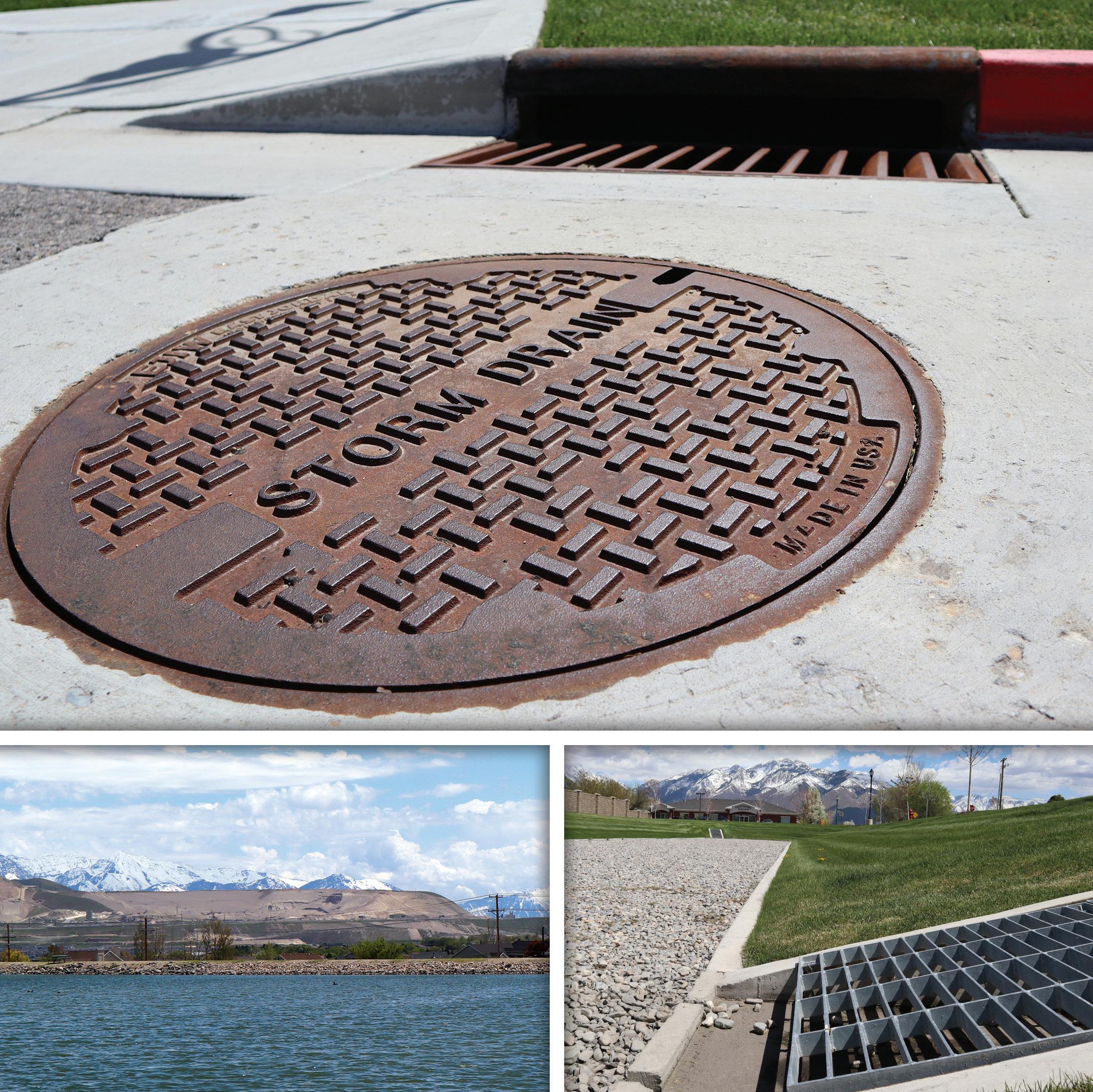

Revenues
StormwaterImpactFee Expenses
The Road Impact Fee Fund is used to track revenue and expenditures for eligible capital improvements to roadways and bridges that are attributable to growth from new development within Riverton.

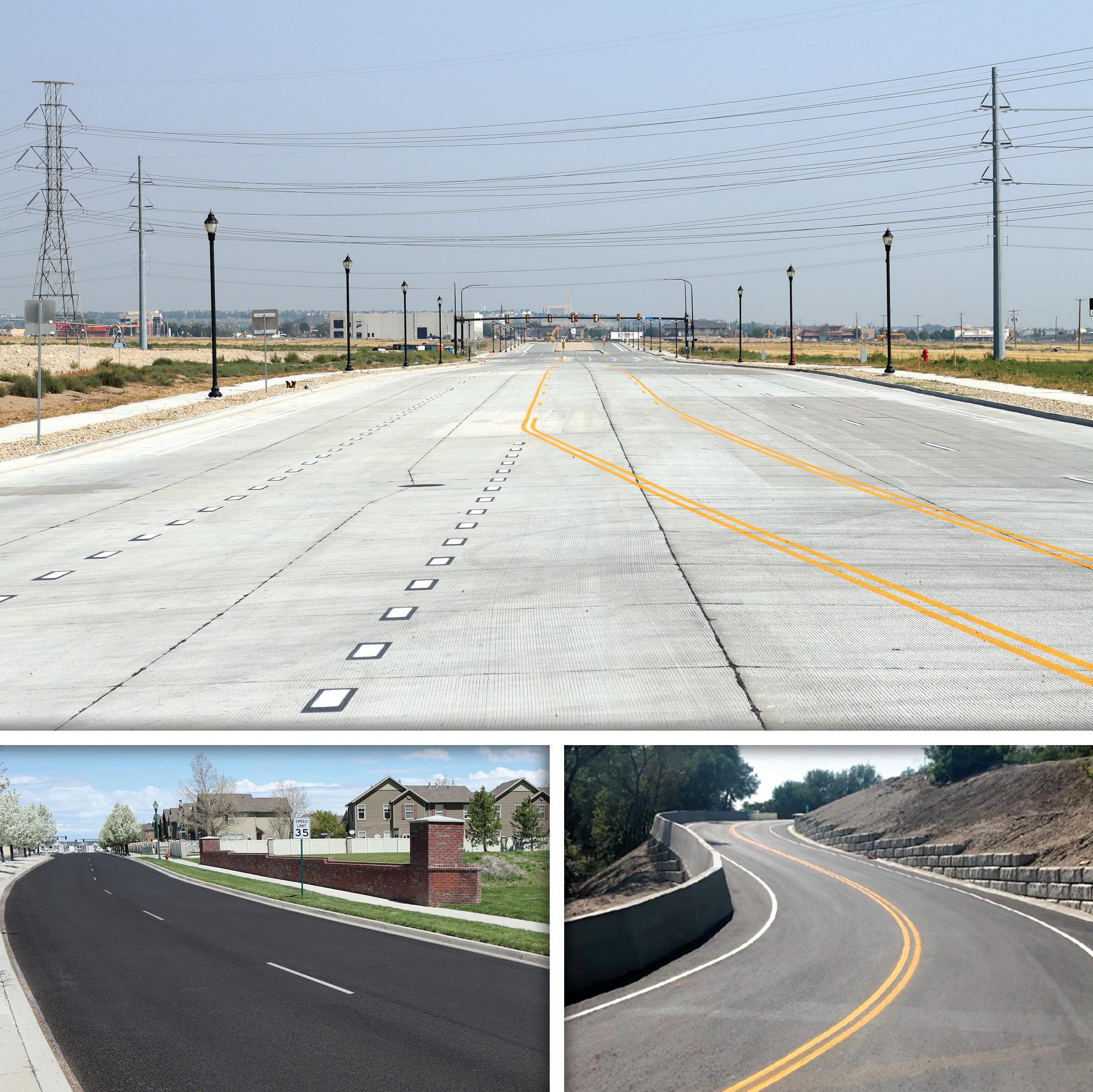
The Capital Improvement Fund is used to account for general governmental capital projects that are ineligible to be financed with impact fees.
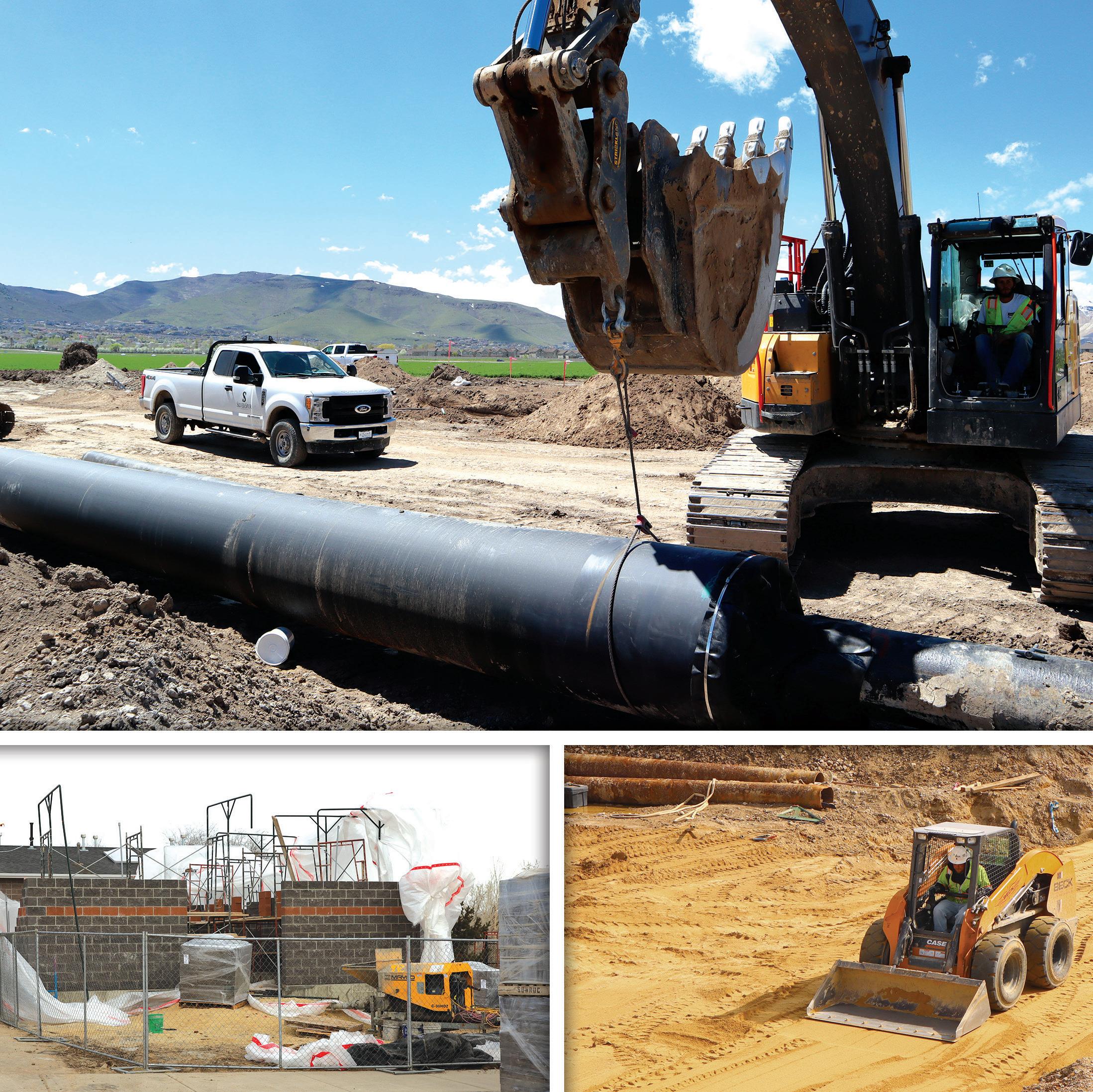

Capital Improvements Fund Revenues
Capital Improvements Fund Expenditures
Trail Overlays - Cut by CM and Finance and move to next fiscal year
• Neighborhood Pavillion replacement as determined by safety inspections
• Playground replacement as determined by safety inspections
• Smart Controller Replacement
• CR Hamilton Replace Stolen Branch Wire
• Pickle Ball Court Resurface City Park
• PW Car Wash Repairs/Replacement – Boiler and Doors
• Riverton City Hall All Abilities Park – Paid for by TRCC Grant
on
and
(partially
The Stormwater Capital Improvement Fund is used to account for stormwater capital projects that are ineligible to be financed with impact fees.
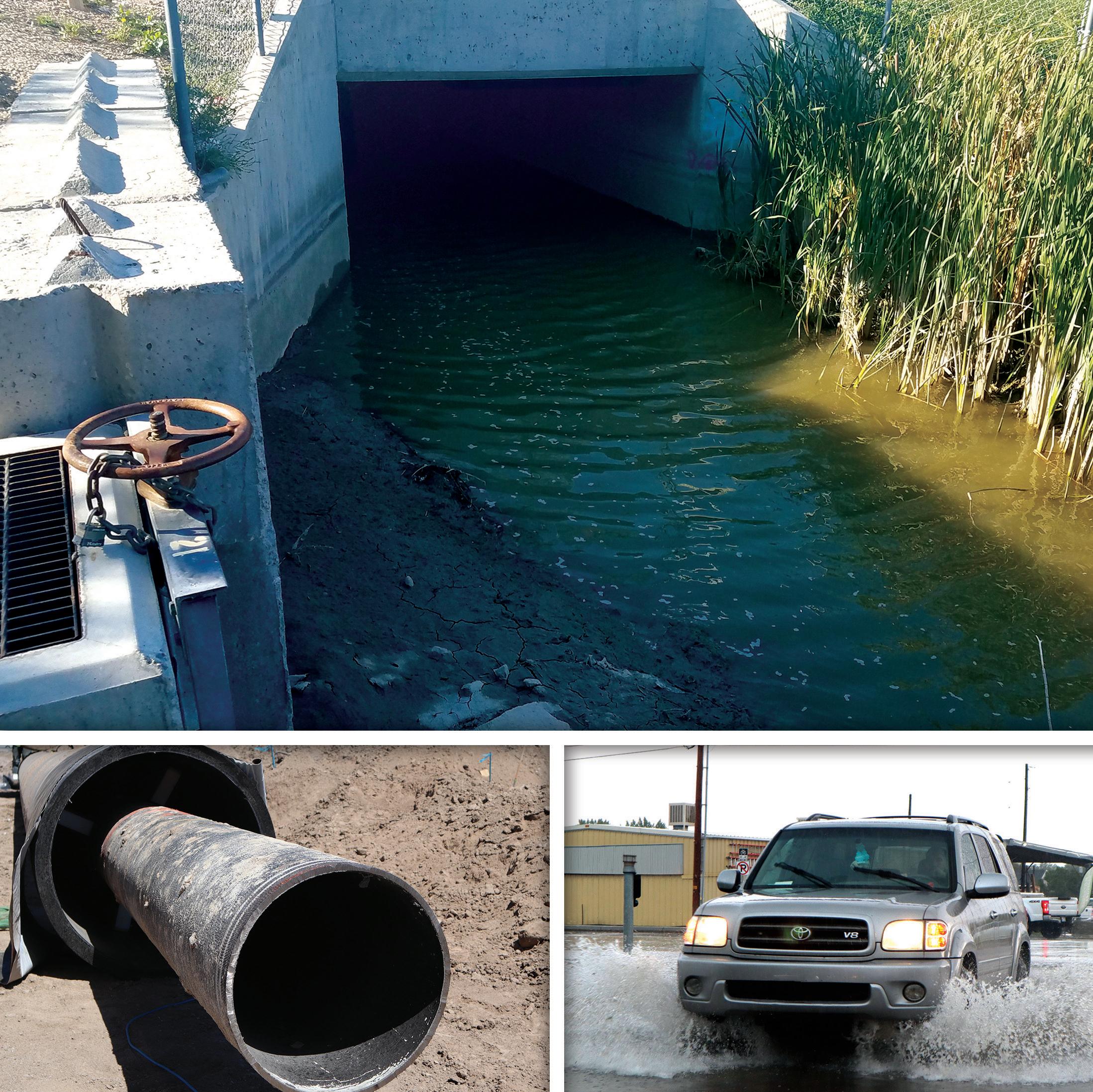

Capital Improvement Fund
The First Class Roads Capitol Improvement Fund is used to track the revenue and expenditures for capital projects eligible under Utah State House Bill 244.


Capital Improvements Fund Summary - First Class Roads
12830 S (RR-1300 W)
12600 S Huron - center median dividers • Streetlighting Upgrades • Deficiencies in streetlight coverage, part of ongoing process to improve
The Grants Fund accounts for the revenue and expenditures associated with federal grants such as the American Rescue Plan.

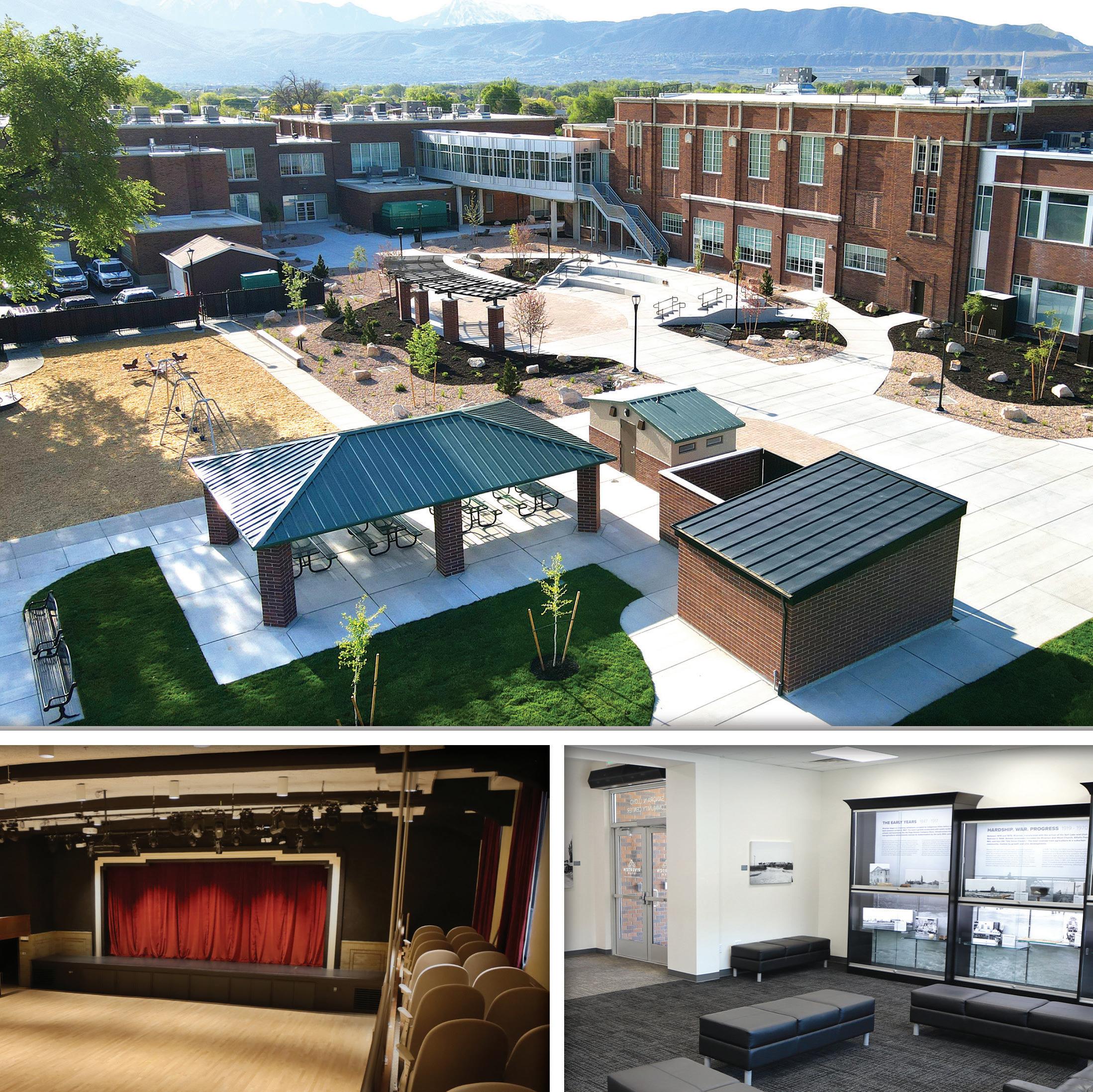
The Culinary Water fund is used to account for revenues and expenditures related to Riverton City’s culinary water system operations.


Culinary Water Fund Summary
Additional budget for education and conferences to be allocated to all departments at the discretion of the City Manager
•
• Cla-Val Training
• LTAP Flagger, TCS, TCT, and welding safety
• Rural Water Spring and fall conferences
• AWWA mid- year and fall conferences
• Treatment Operator Cert for Green Well RO
• Water Users Conference
• Reverse Osmosis for Green Well
• Misc CEU's & training
**Working Capital is cash, adjusted for receivables, payables, current year asset additions, etc.
The Culinary Water Impact Fee Fund is used to track revenue and expenses for eligible capital improvements to the culinary water system that are attributable to growth from new development within Riverton.
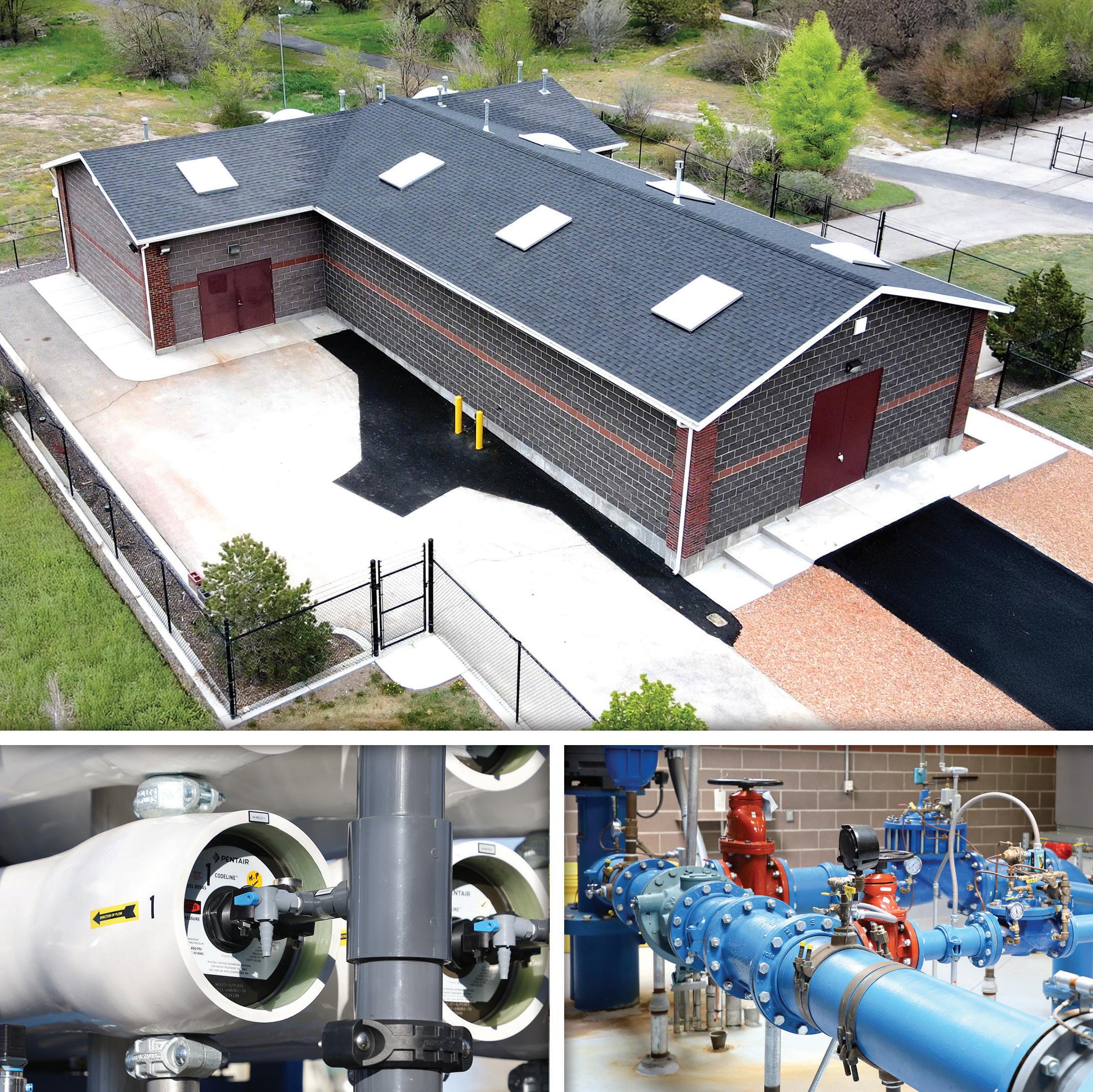

The Secondary Water Pressurized Irrigation Fund is used to account for revenues and expenditures related to Riverton City’s secondary water system operations.


Pressurized Irrigation (Secondary Water) Fund Summary
Various trainings and conferences including but not limited to: ULCT, ICMA, ICSC, fall elected officials conference, disaster trainings, etc. (split with 100 and 510 funds)
Various trainings and conferences including but not limited to:
officials conference,
etc. (split with 100 and 510 funds)
UCMA, ULCT, UGFOA, NLCT, Munis
and other
Council
Additional budget for education and conferences to be allocated to all departments at the discretion of the City Manager
The Secondary Water Impact Fee Fund is used to track revenue and expenses related to eligible capital improvements to the secondary water system, which is attributable to growth from new development within Riverton.
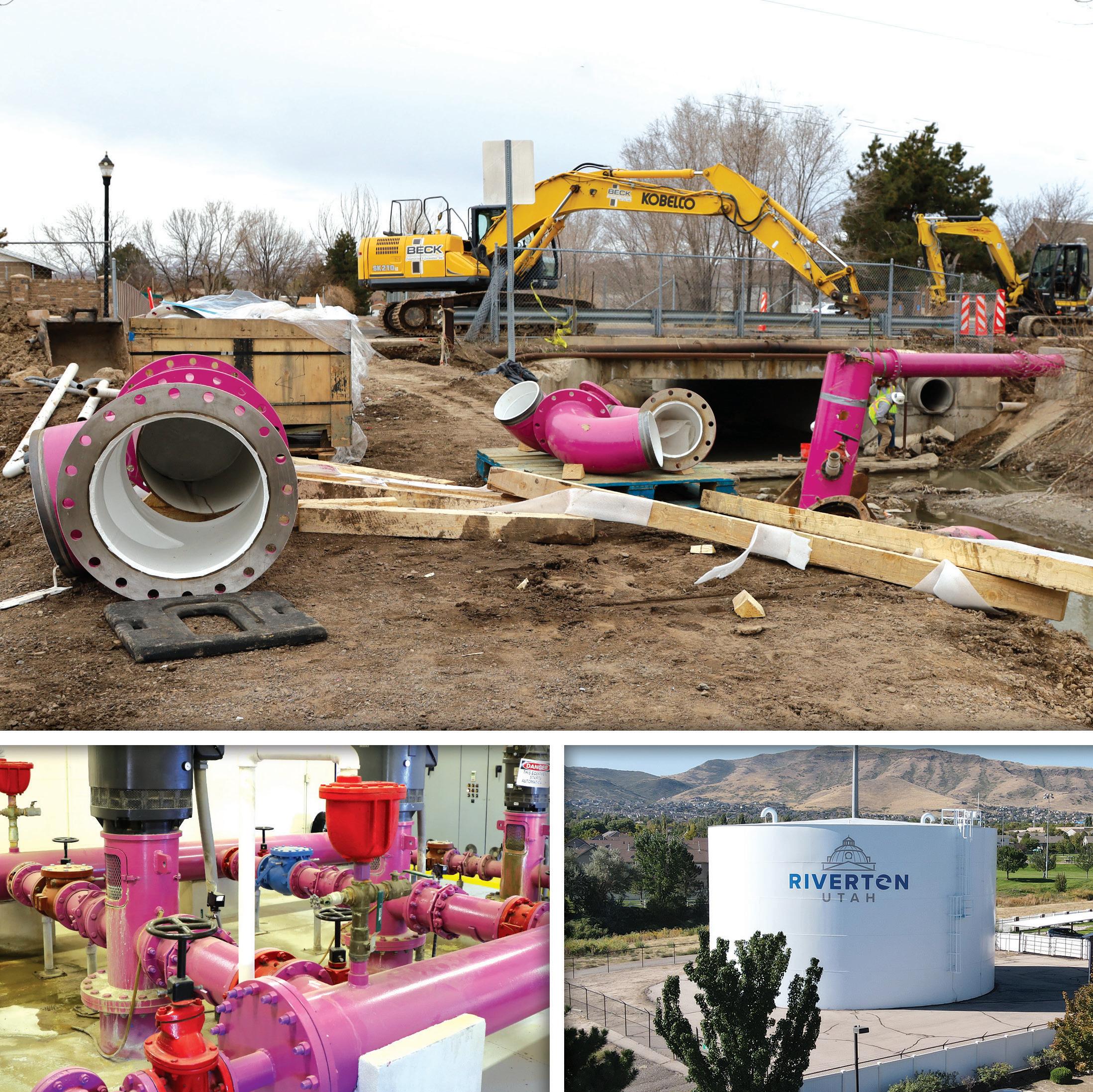

FISCAL YEAR 2025-2026
The Sanitation Fund is used to account for activities of Riverton City’s solid waste and recycling collection operations.

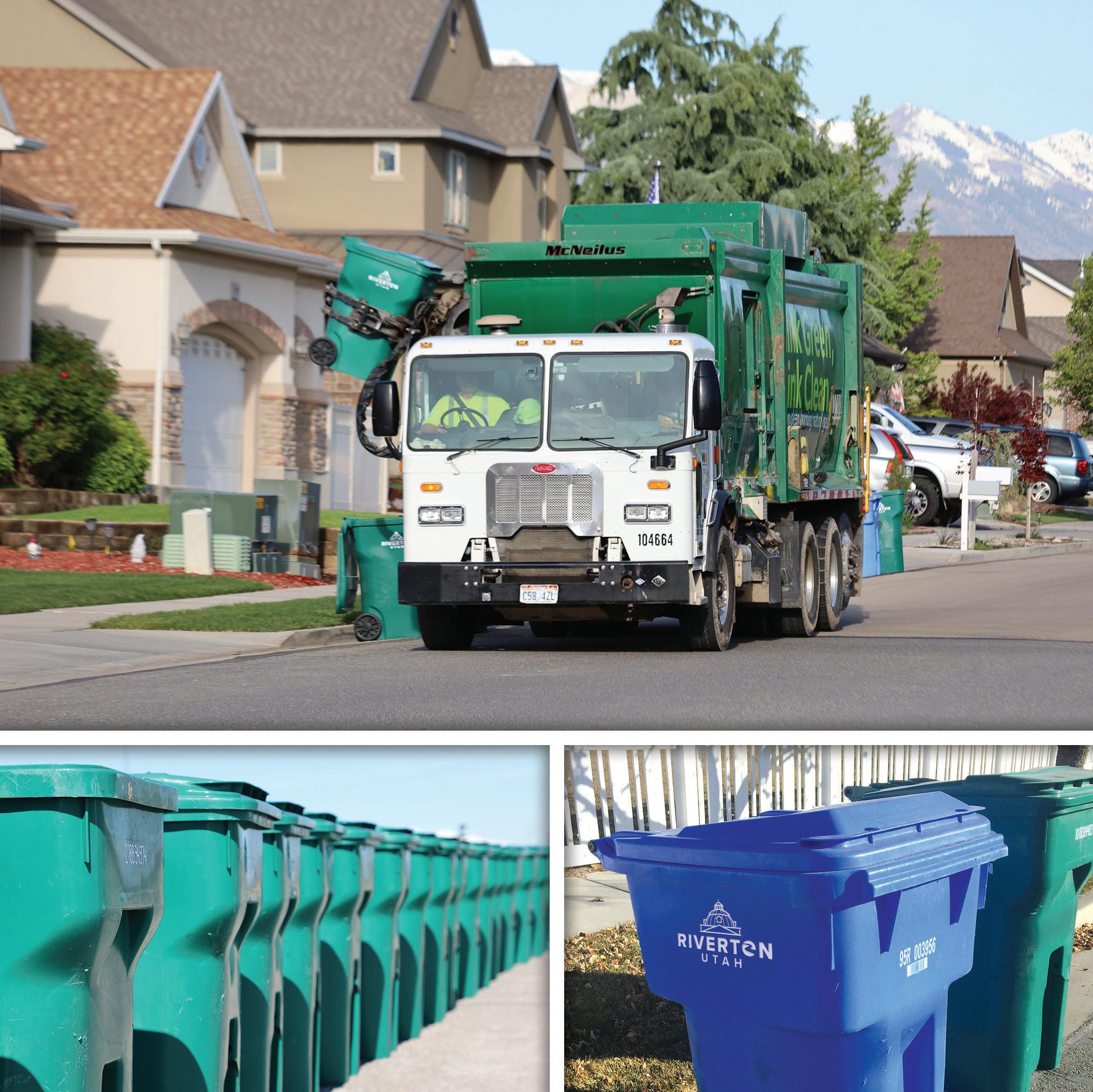
Council
•
Mayor's
Council
Council
•
Council


Theabovepayscalehasbeenadjustedfromthepreviousyearbasedona benchmarkanalysisofthesurroundingcities.




















Adopted Budget – The budget officially approved by the City Council that establishes the legal authority authorizing spending for the fiscal year.
Budget – A detailed financial plan outlining proposed expenditures and their purposes, along with funding sources, for a specified period of time.
Capital Outlay – Spending that results in the purchase or creation of a capital asset (e.g. buildings, equipment).
Department – A main administrative unit responsible for specific city operations or services.

Enterprise Fund – A fund established to account for operations that are financed and operated in a manner similar to private business enterprises – the services are predominantly self-supported by user fees and charges. Examples are culinary water, secondary water, and sanitation.
Expenditure – The actual spending of governmental funds set aside by an appropriation.
Expenses – The spending of propriety (business-like) fund resources that have been appropriated.
Fiscal Year – The 12-month accounting period used for budgeting; Riverton City’s fiscal year is from July 1 to June 30.
Franchise Tax – A tax levied at the state level against businesses and partnerships chartered within a state. Riverton City charges a 6% franchise tax on utilities like electricity and gas.
Full Time Equivalent (FTE) – A staffing measure representing one full-time employee or the combined hours of part-time employees equaling 2,080 hours annually.

Fund – A fiscal or accounting entity with a self-balancing set of accounts established for the purpose of carrying out specific activities in according with clearly defined restrictions and/or limitations.
Fund Balance – The net difference between a fund’s total assets and liabilities.
General Fund – The primary fund of the City used to account for all financial resources except those identified for special purposes or required to be account for in another fund.
Grant – Funds received from another government for specific projects, activities, or facilities.
Impact Fees – Fees used to offset the additional burden on city infrastructure caused by new development within a city. The fees are collected and accounted for separately to be used for projects relating to the impact of the additional development.
Intergovernmental Revenue – Funds collected by one government and shared with another (e.g., state to city).
Long-term Debt – Borrowed money that must be repaid over a period longer than one year.

Operating Expenditures –
Day-to-day costs for materials, supplies, and services needed by departments.
Operating Revenues –
Funds received by the City as income to pay for ongoing operations.
Property Tax – An ad valorem (according to value) tax based on the fair market value of real property and personal property. Fair market value is determined by the county.
Redevelopment Agency (RDA) – A separate entity formed to revitalize blighted areas and promote economic development.

Revenue Bonds – Bonds repaid from specific revenue sources (e.g. franchise tax, secondary water fees, sales tax).
Revenues – Sources of income such as taxes used to finance the operation of government.
Sales Tax – Tax imposed on the taxable sales of all final goods. Riverton receives part of the 7.25% sales tax charged in Salt Lake County.
Special Revenue Fund –Fund used to account for specific revenue sources that is legally restricted to be spent for specified purposes. Examples are RLESA or RFSA funds.
Taxes – Mandatory payments to the government used to fund public services and infrastructure for the benefit of the people.
Transfers – Legally authorized intra-city transfers of appropriation from one City fund to another City fund. Revenues and expenditures are accounted for in both funds.




